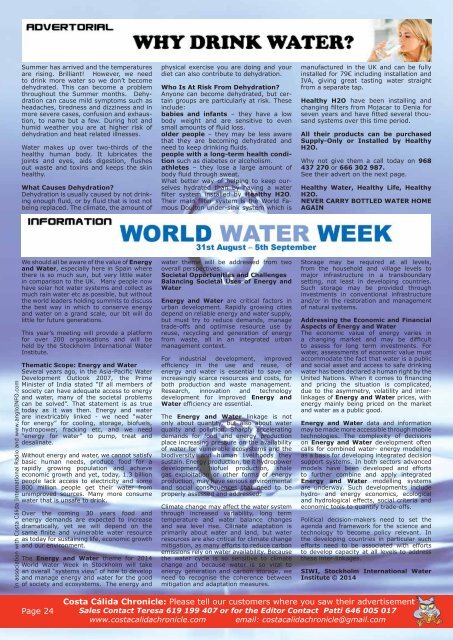august-2014
august-2014
august-2014
Create successful ePaper yourself
Turn your PDF publications into a flip-book with our unique Google optimized e-Paper software.
Summer has arrived and the temperatures<br />
are rising. Brilliant! However, we need<br />
to drink more water so we don’t become<br />
dehydrated. This can become a problem<br />
throughout the Summer months. Dehydration<br />
can cause mild symptoms such as<br />
headaches, tiredness and dizziness and in<br />
more severe cases, confusion and exhaustion,<br />
to name but a few. During hot and<br />
humid weather you are at higher risk of<br />
dehydration and heat related illnesses.<br />
Water makes up over two-thirds of the<br />
healthy human body. It lubricates the<br />
joints and eyes, aids digestion, flushes<br />
out waste and toxins and keeps the skin<br />
healthy.<br />
What Causes Dehydration?<br />
Dehydration is usually caused by not drinking<br />
enough fluid, or by fluid that is lost not<br />
being replaced. The climate, the amount of<br />
physical exercise you are doing and your<br />
diet can also contribute to dehydration.<br />
Who Is At Risk From Dehydration?<br />
Anyone can become dehydrated, but certain<br />
groups are particularly at risk. These<br />
include:<br />
babies and infants – they have a low<br />
body weight and are sensitive to even<br />
small amounts of fluid loss.<br />
older people – they may be less aware<br />
that they are becoming dehydrated and<br />
need to keep drinking fluids.<br />
people with a long-term health condition<br />
such as diabetes or alcoholism.<br />
athletes – they lose a large amount of<br />
body fluid through sweat.<br />
What better way of helping to keep ourselves<br />
hydrated than by having a water<br />
filter system installed by Healthy H2O.<br />
Their main filter system is the World Famous<br />
Doulton under-sink system which is<br />
manufactured in the UK and can be fully<br />
installed for 79€ including installation and<br />
IVA, giving great tasting water straight<br />
from a separate tap.<br />
Healthy H2O have been installing and<br />
changing filters from Mojacar to Denia for<br />
seven years and have fitted several thousand<br />
systems over this time period.<br />
All their products can be purchased<br />
Supply-Only or Installed by Healthy<br />
H2O.<br />
Why not give them a call today on 968<br />
437 270 or 666 302 987.<br />
See their advert on the next page.<br />
Healthy Water, Healthy Life, Healthy<br />
H2O.<br />
NEVER CARRY BOTTLED WATER HOME<br />
AGAIN<br />
In association with Costa Cálida International Radio and www.angloINFO.com<br />
We should all be aware of the value of Energy<br />
and Water, especially here in Spain where<br />
there is so much sun, but very little water<br />
in comparison to the UK. Many people now<br />
have solar hot water systems and collect as<br />
much rain water etc as possible, but without<br />
the world leaders holding summits to discuss<br />
the best way in which to conserve energy<br />
and water on a grand scale, our bit will do<br />
little for future generations.<br />
This year’s meeting will provide a platform<br />
for over 200 organisations and will be<br />
held by the Stockholm International Water<br />
Institute.<br />
Thematic Scope: Energy and Water<br />
Several years ago, in the Asia-Pacific Water<br />
Development Outlook 2007, the Prime<br />
Minister of India stated “If all members of<br />
society can have adequate access to energy<br />
and water, many of the societal problems<br />
can be solved”. That statement is as true<br />
today as it was then. Energy and water<br />
are inextricably linked - we need “water<br />
for energy” for cooling, storage, biofuels,<br />
hydropower, fracking etc, and we need<br />
“energy for water” to pump, treat and<br />
desalinate.<br />
Without energy and water, we cannot satisfy<br />
basic human needs, produce food for a<br />
rapidly growing population and achieve<br />
economic growth and yet, today, 1.3 billion<br />
people lack access to electricity and some<br />
800 million people get their water from<br />
unimproved sources. Many more consume<br />
water that is unsafe to drink.<br />
Over the coming 30 years food and<br />
energy demands are expected to increase<br />
dramatically, yet we will depend on the<br />
same finite and vulnerable water resource<br />
as today for sustaining life, economic growth<br />
and our environment.<br />
The Energy and Water theme for <strong>2014</strong><br />
World Water Week in Stockholm will take<br />
an overall “systems view” of how to develop<br />
and manage energy and water for the good<br />
of society and ecosystems. The energy and<br />
water theme will be addressed from two<br />
overall perspectives:<br />
Societal Opportunities and Challenges<br />
Balancing Societal Uses of Energy and<br />
Water<br />
Energy and Water are critical factors in<br />
urban development. Rapidly growing cities<br />
depend on reliable energy and water supply,<br />
but must try to reduce demands, manage<br />
trade-offs and optimise resource use by<br />
reuse, recycling and generation of energy<br />
from waste, all in an integrated urban<br />
management context.<br />
For industrial development, improved<br />
efficiency in the use and reuse, of<br />
energy and water is essential to save on<br />
increasingly scarce resources and costs, for<br />
both production and waste management.<br />
Research, innovation and technology<br />
development for improved Energy and<br />
Water efficiency are essential.<br />
The Energy and Water linkage is not<br />
only about quantity, but also about water<br />
quality and pollution. Sharply accelerating<br />
demands for food and energy production<br />
place increasing pressure on the availability<br />
of water for vulnerable ecosystems and the<br />
biodiversity and human livelihoods they<br />
sustain. Energy production, be it hydropower<br />
development, biofuel production, shale<br />
gas exploitation or other forms of energy<br />
production, may have serious environmental<br />
and social consequences that need to be<br />
properly assessed and addressed.<br />
Climate change may affect the water system<br />
through increased variability, long term<br />
temperature and water balance changes<br />
and sea level rise. Climate adaptation is<br />
primarily about water and land, but water<br />
resources are also critical for climate change<br />
mitigation, as many efforts to reduce carbon<br />
emissions rely on water availability. Because<br />
the water cycle is so sensitive to climate<br />
change and because water is so vital to<br />
energy generation and carbon storage, we<br />
need to recognise the coherence between<br />
mitigation and adaptation measures.<br />
Storage may be required at all levels,<br />
from the household and village levels to<br />
major infrastructure in a transboundary<br />
setting, not least in developing countries.<br />
Such storage may be provided through<br />
investments in conventional infrastructure<br />
and/or in the restoration and management<br />
of natural systems.<br />
Addressing the Economic and Financial<br />
Aspects of Energy and Water<br />
The economic value of energy varies in<br />
a changing market and may be difficult<br />
to assess for long term investments. For<br />
water, assessments of economic value must<br />
accommodate the fact that water is a public<br />
and social asset and access to safe drinking<br />
water has been declared a human right by the<br />
United Nations. When it comes to financing<br />
and pricing the situation is complicated,<br />
due to the asymmetry, volatility and interlinkages<br />
of Energy and Water prices, with<br />
energy mainly being priced on the market<br />
and water as a public good.<br />
Energy and Water data and information<br />
may be made more accessible through mobile<br />
technologies. The complexity of decisions<br />
on Energy and Water development often<br />
calls for combined water- energy modelling<br />
as a basis for developing integrated decision<br />
support systems. In both sectors advanced<br />
models have been developed and efforts<br />
to further combine and apply integrated<br />
Energy and Water modelling systems<br />
are underway. Such developments include<br />
hydro- and energy economics, ecological<br />
and hydrological effects, social criteria and<br />
economic tools to quantify trade-offs.<br />
Political decision-makers need to set the<br />
agenda and framework for the science and<br />
technology to become policy relevant. In<br />
the developing countries in particular such<br />
efforts need to be associated with efforts<br />
to develop capacity at all levels to address<br />
these inter-linkages.<br />
SIWI, Stockholm International Water<br />
Institute © <strong>2014</strong><br />
Page 24<br />
Costa Cálida Chronicle: Please tell our customers where you saw their advertisement t<br />
Sales Contact Teresa 619 199 407 or for the Editor Contact Patti 646 005 017<br />
www.costacalidachronicle.com email: costacalidachronicle@gmail.com



